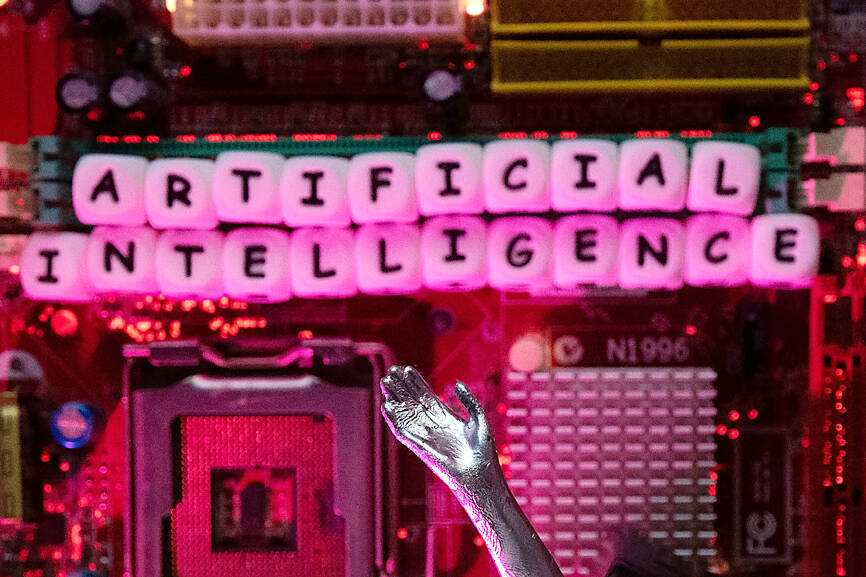The Chinese Communist Party (CCP) has combined military and civilian artificial intelligence (AI) resources to enhance its cyberwarfare capabilities against Taiwan, seeking opportunities to launch cyberattacks, disseminate disinformation and damage key infrastructure, the National Security Bureau (NSB) said in a recent report that it delivered to the legislature.
The AI could be used to identify security loopholes in software and hardware, and generate mutated computer viruses that are difficult to detect, the bureau said.
“Through AI, the intensity of denial-of-service attacks could be enhanced, and botnets can be more effectively manipulated, making cyberattacks more automatic, random and hidden,” it said.

Photo: Reuters
“AI can manufacture massive amounts of deepfake videos and disinformation based on scripted information, which can be spread through fake online accounts and bots,” the bureau said.
Beijing has integrated AI resources from the military and civilians to boost its cyberwarfare capabilities against Taiwan, the bureau said, adding that China is waiting for opportunities to launch cyberattacks, spread disinformation and damage key infrastructure.
The bureau said it would continue to tackle the cybersecurity threat from China by partnering with the private sector, and adding AI to cybersecurity systems to detect cyberattacks and identify false content.
“We would form a digital united front by sharing intelligence with our international allies, including the types of cyberattacks used by China and other organizations, and the ways disinformation is spread,” it said.
AI allows hackers to launch precise attacks on a much larger scale, the Ministry of Digital Affairs said, adding that enhanced technology and media literacy capabilities are ways to tackle the threat.
Separately, deepfake technology in China has matured at commercial and military levels, Taiwan Association of University Professors deputy chairman Chen Li-fu (陳俐甫) said.
Beijing could pay Internet celebrities, commentators and news media in Taiwan to help the spread of deepfake-generated content, Chen added.
If China uses its military forces to take over Taiwan, wars would be launched on physical battlegrounds and in cyberspace simultaneously, he said.
“Having the Information, Communications and Electronic Force Command is not enough. Instead of defending against cyberattacks, the command should be able to use AI to launch cyberattacks as well. The government should be able to maintain direct communication with the public during wartime,” he said.
Additional reporting by Chen Cheng-yu

Taiwan is stepping up plans to create self-sufficient supply chains for combat drones and increase foreign orders from the US to counter China’s numerical superiority, a defense official said on Saturday. Commenting on condition of anonymity, the official said the nation’s armed forces are in agreement with US Admiral Samuel Paparo’s assessment that Taiwan’s military must be prepared to turn the nation’s waters into a “hellscape” for the Chinese People’s Liberation Army (PLA). Paparo, the commander of the US Indo-Pacific Command, reiterated the concept during a Congressional hearing in Washington on Wednesday. He first coined the term in a security conference last

Prosecutors today declined to say who was questioned regarding alleged forgery on petitions to recall Democratic Progressive Party (DPP) legislators, after Chinese-language media earlier reported that members of the Chinese Nationalist Party (KMT) Youth League were brought in for questioning. The Ministry of Justice Investigation Bureau confirmed that two people had been questioned, but did not disclose any further information about the ongoing investigation. KMT Youth League members Lee Hsiao-liang (李孝亮) and Liu Szu-yin (劉思吟) — who are leading the effort to recall DPP caucus chief executive Rosalia Wu (吳思瑤) and Legislator Wu Pei-yi (吳沛憶) — both posted on Facebook saying: “I

The Ministry of Economic Affairs has fined Taobao NT$1.2 million (US$36,912) for advertisements that exceed its approved business scope, requiring the Chinese e-commerce platform to make corrections in the first half of this year or its license may be revoked. Lawmakers have called for stricter enforcement of Chinese e-commerce platforms and measures to prevent China from laundering its goods through Taiwan in response to US President Donald Trump’s heavy tariffs on China. The Legislative Yuan’s Finance Committee met today to discuss policies to prevent China from dumping goods in Taiwan, inviting government agencies to report. Democratic Progressive Party Legislator Kuo Kuo-wen (郭國文) said

The Ministry of Economic Affairs has fined Taobao NT$1.2 million (US$36,900) for advertisements that exceeded its approved business scope and ordered the Chinese e-commerce platform to make corrections in the first half of this year or its license would be revoked. Lawmakers have called for stricter supervision of Chinese e-commerce platforms and more stringent measures to prevent China from laundering its goods through Taiwan as US President Donald Trump’s administration cracks down on origin laundering. The legislature’s Finance Committee yesterday met to discuss policies to prevent China from dumping goods in Taiwan, inviting government agencies to report on the matter. Democratic Progressive Party